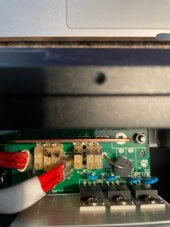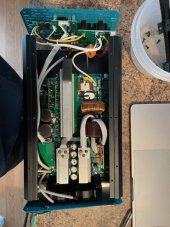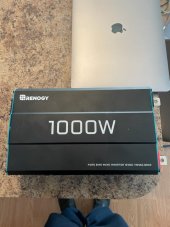featherlite
Solar Enthusiast
I am posting this just to document the fact that my two year old shorted out, presumably because I accidentally overloaded the unit?
I have a 12v 1000W Renogy, pure sine wave inverter, 2000 watt surge.
The inverter shorted out when I plugged my heat gun into the AC outlet. The heat gun has high and low setting, 825 watts on low and 1150 watts on high. Off on on over the last few days, I had been running the heat gun on low for a few minutes each time, but occasionally for 15 minutes in a row. Once or twice, I turned the heat gun on high for a few minutes to test my breaker trip curve. At no time did the inverter shut down or trigger any alarm.
Today, the inverter immediately shorted out when I turned the heat gun switch on. I intended to turn the switch to the low setting but might have accidently turned the switch all the way to the high setting. I dunno.
Maybe I abused the unit too much and it finally shorted out due to previous cumulative abuse. Again, I dunno.
In any event, now when I close the breaker to the inverter, my BMS immediately disconnects all loads and displays the warning "shorted out"; after repeated attempts to restart the inverter.
My testing has ruled out any problem with the BMS, the wiring and/or the breaker to the inverter. I did so by successfully replacing the inoperable inverter with another working inverter.
I opened up the inverter on my work bench and saw six 25A mini ATC type blade fuses, soldered onto the circuit board. All six fuses tested good, with a continuity meter with probes on the underside of the circuit board. Even though the fuses appeared to be good, they all had a blackish brown spot on the top. I saw no other visible burn marks and smelled nothing amiss, at least to my untrained eye.
See the six fuses in the attached photo. The fuses are soldered onto the circuit board. Otherwise i would have tried to replace them. Later on, I may try to replace the fuses and see if it fixes the problem, although I do not have one of those solder sucker tools I have seen on youtube. I have very little soldering experience.
The inverter is two years old with a one year warranty. The original cost was $180, whereas a replacement unit now costs about $230.
I decided to replace the unit with an identical new Renogy unit with the same specs, primarily because the footprint matches my existing mounting location and wiring runs in my trailer with limited space.
There are at least two other posts on this forum saying that their Renogy inverter with eco mode failed. Their units had a switch to turn eco mode feature on and off. My unit automatically turns eco mode on and off, depending on the load.
Do 1000 watt inverters typically short out if overload by 150 watts?
I have a 12v 1000W Renogy, pure sine wave inverter, 2000 watt surge.
The inverter shorted out when I plugged my heat gun into the AC outlet. The heat gun has high and low setting, 825 watts on low and 1150 watts on high. Off on on over the last few days, I had been running the heat gun on low for a few minutes each time, but occasionally for 15 minutes in a row. Once or twice, I turned the heat gun on high for a few minutes to test my breaker trip curve. At no time did the inverter shut down or trigger any alarm.
Today, the inverter immediately shorted out when I turned the heat gun switch on. I intended to turn the switch to the low setting but might have accidently turned the switch all the way to the high setting. I dunno.
Maybe I abused the unit too much and it finally shorted out due to previous cumulative abuse. Again, I dunno.
In any event, now when I close the breaker to the inverter, my BMS immediately disconnects all loads and displays the warning "shorted out"; after repeated attempts to restart the inverter.
My testing has ruled out any problem with the BMS, the wiring and/or the breaker to the inverter. I did so by successfully replacing the inoperable inverter with another working inverter.
I opened up the inverter on my work bench and saw six 25A mini ATC type blade fuses, soldered onto the circuit board. All six fuses tested good, with a continuity meter with probes on the underside of the circuit board. Even though the fuses appeared to be good, they all had a blackish brown spot on the top. I saw no other visible burn marks and smelled nothing amiss, at least to my untrained eye.
See the six fuses in the attached photo. The fuses are soldered onto the circuit board. Otherwise i would have tried to replace them. Later on, I may try to replace the fuses and see if it fixes the problem, although I do not have one of those solder sucker tools I have seen on youtube. I have very little soldering experience.
The inverter is two years old with a one year warranty. The original cost was $180, whereas a replacement unit now costs about $230.
I decided to replace the unit with an identical new Renogy unit with the same specs, primarily because the footprint matches my existing mounting location and wiring runs in my trailer with limited space.
There are at least two other posts on this forum saying that their Renogy inverter with eco mode failed. Their units had a switch to turn eco mode feature on and off. My unit automatically turns eco mode on and off, depending on the load.
Do 1000 watt inverters typically short out if overload by 150 watts?
Attachments
Last edited:





